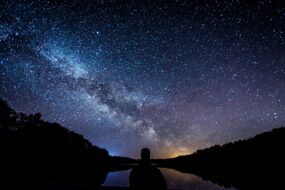May 13, 2015 • Life for Leaders
God blessed them, and God said to them, ‘Be fruitful and multiply, and fill the earth and subdue it; and have dominion over the fish of the sea and over the birds of the air and over every living thing that moves upon the earth.’ ”
Genesis 1:28
If, like me, you’ve been a Christian for a while, you might find the insights of Genesis 1:28 to be obvious. It’s easy for us to assume that the biblical understanding of human life is rather ordinary, shared by most people across the world throughout history.
The truth is strikingly different, however. Many philosophies and religious traditions do not value human life in the mode of Genesis 1. Today, for example, challenges to human dignity might come from philosophical materialists who believe human beings are merely the result of the fickleness of natural selection. In the time in which the creation account in Genesis was written down and passed on orally among the Jewish people, a striking difference existed between the biblical narrative and other popular creation stories.
Take the ancient Babylonian creation myth, for example. The Enuma Elish tells a very different story of the creation and purpose of human life. In this account, the gods fought a heavenly battle. The losing deities were sentenced by the winner, Marduk, to take care of the earth. Because this is hard work, they complain to Marduk and offer to build a house for him. He relents, creating human beings to make life easier for the gods: “When Marduk hears the words of the gods, His heart prompts him to fashion artful works. Opening his mouth, he addresses Ea, To impart the plan he had conceived in his heart: “Blood I will mass and cause bones to be. I will establish a savage, ‘man’ shall be his name. Verily, savage-man I will create. He shall be charged with the service of the gods, That they might be at ease! (Enuma Elish, VI:1-44, trans. E. A Speiser in Ancient Near Eastern Texts)
In the Babylonian story and in Genesis, human beings end up with the task of taking care of the earth. But the contrast in meaning couldn’t be more distinct. In the Babylonian account, human beings are savages and servants of the gods, created so the gods can relax. In Genesis, God made human beings in God’s own image. Our responsibility to care for the earth is a reflection of our divine likeness. It is an honor. We are not savage slaves, but divine co-workers. We are royalty with the authority to rule.
This royal “we” includes all human beings. Of course, some of us have been given greater functional authority in the world. We may be bosses, CEOs, teachers, mayors, police officers, sergeants, or presidents. We are to use our authority in a way that honors God, recognizing God’s supreme authority. Moreover, because our authority is based on the image of God, we seek to serve those in our charge, helping them to see their own royal dignity and to exercise their authority over the portion of creation entrusted to them. We are most fully human when we share together as human beings in our common calling to steward creation well.
QUESTIONS TO CONSIDER:
If you are someone who has been given authority over people, do you see your role as helping them discover and exercise their giftedness and authority? If so, how do you do this? How might we exercise authority as leaders without being authoritarian?
PRAYER:
O LORD, our Sovereign,
how majestic is your name in all the earth!
You have set your glory above the heavens.
Out of the mouths of babes and infants
you have founded a bulwark because of your foes,
to silence the enemy and the avenger.
When I look at your heavens, the work of your fingers,
the moon and the stars that you have established;
what are human beings that you are mindful of them,
mortals that you care for them?
Yet you have made them a little lower than God,
and crowned them with glory and honor.
You have given them dominion over the works of your hands;
you have put all things under their feet,
all sheep and oxen,
and also the beasts of the field,
the birds of the air, and the fish of the sea,
whatever passes along the paths of the seas.
O LORD, our Sovereign,
how majestic is your name in all the earth! Amen.
(Psalm 8)

Dr. Mark D. Roberts is a Senior Strategist for Fuller’s Max De Pree Center for Leadership, where he focuses on the spiritual development and thriving of leaders. He is the principal writer of the daily devotional, Life for Leaders, and the founder of the De Pree Center’s Flourishing in the Third Third of Life Initiative. Previously, Mark was the Executive Director of the De Pree Center, the lead pastor of a church in Southern California, and the Senior Director of Laity Lodge in Texas. He has written eight books, dozens of articles, and over 2,500 devotions that help people discover the difference God makes in their daily life and leadership. With a Ph.D. in New Testament from Harvard, Mark teaches at Fuller Seminary, most recently in his D.Min. cohort on “Faith, Work, Economics, and Vocation.” Mark is married to Linda, a marriage and family counselor, spiritual director, and executive coach. Their two grown children are educators on the high school and college level.




